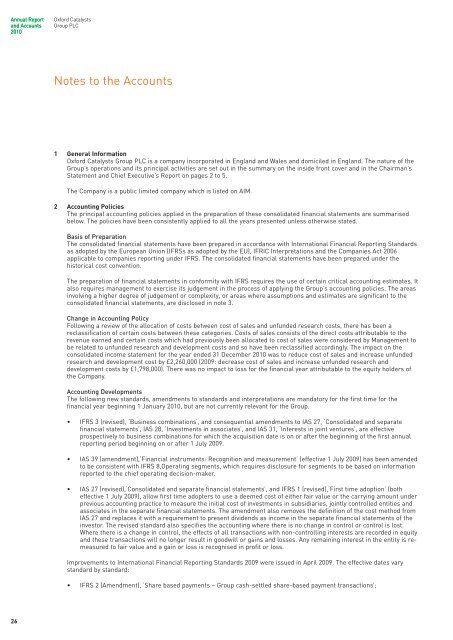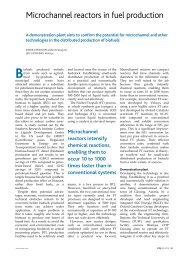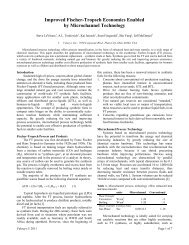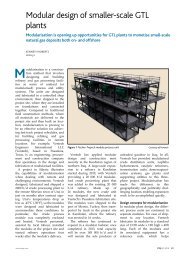Oxford Catalysts Group PLC Annual Report and Accounts 2010
Oxford Catalysts Group PLC Annual Report and Accounts 2010
Oxford Catalysts Group PLC Annual Report and Accounts 2010
Create successful ePaper yourself
Turn your PDF publications into a flip-book with our unique Google optimized e-Paper software.
<strong>Annual</strong> <strong>Report</strong><strong>and</strong> <strong>Accounts</strong><strong>2010</strong><strong>Oxford</strong> <strong>Catalysts</strong><strong>Group</strong> <strong>PLC</strong>Notes to the <strong>Accounts</strong>1 General Information<strong>Oxford</strong> <strong>Catalysts</strong> <strong>Group</strong> <strong>PLC</strong> is a company incorporated in Engl<strong>and</strong> <strong>and</strong> Wales <strong>and</strong> domiciled in Engl<strong>and</strong>. The nature of the<strong>Group</strong>’s operations <strong>and</strong> its principal activities are set out in the summary on the inside front cover <strong>and</strong> in the Chairman’sStatement <strong>and</strong> Chief Executive’s <strong>Report</strong> on pages 2 to 5.The Company is a public limited company which is listed on AIM.2 Accounting PoliciesThe principal accounting policies applied in the preparation of these consolidated financial statements are summarisedbelow. The policies have been consistently applied to all the years presented unless otherwise stated.Basis of PreparationThe consolidated financial statements have been prepared in accordance with International Financial <strong>Report</strong>ing St<strong>and</strong>ardsas adopted by the European Union (IFRSs as adopted by the EU), IFRIC Interpretations <strong>and</strong> the Companies Act 2006applicable to companies reporting under IFRS. The consolidated financial statements have been prepared under thehistorical cost convention.The preparation of financial statements in conformity with IFRS requires the use of certain critical accounting estimates. Italso requires management to exercise its judgement in the process of applying the <strong>Group</strong>’s accounting policies. The areasinvolving a higher degree of judgement or complexity, or areas where assumptions <strong>and</strong> estimates are significant to theconsolidated financial statements, are disclosed in note 3.Change in Accounting PolicyFollowing a review of the allocation of costs between cost of sales <strong>and</strong> unfunded research costs, there has been areclassification of certain costs between these categories. Costs of sales consists of the direct costs attributable to therevenue earned <strong>and</strong> certain costs which had previously been allocated to cost of sales were considered by Management tobe related to unfunded research <strong>and</strong> development costs <strong>and</strong> so have been reclassified accordingly. The impact on theconsolidated income statement for the year ended 31 December <strong>2010</strong> was to reduce cost of sales <strong>and</strong> increase unfundedresearch <strong>and</strong> development cost by £2,260,000 (2009: decrease cost of sales <strong>and</strong> increase unfunded research <strong>and</strong>development costs by £1,798,000). There was no impact to loss for the financial year attributable to the equity holders ofthe Company.Accounting DevelopmentsThe following new st<strong>and</strong>ards, amendments to st<strong>and</strong>ards <strong>and</strong> interpretations are m<strong>and</strong>atory for the first time for thefinancial year beginning 1 January <strong>2010</strong>, but are not currently relevant for the <strong>Group</strong>.• IFRS 3 (revised), ‘Business combinations’, <strong>and</strong> consequential amendments to IAS 27, ‘Consolidated <strong>and</strong> separatefinancial statements’, IAS 28, ‘Investments in associates’, <strong>and</strong> IAS 31, ‘Interests in joint ventures’, are effectiveprospectively to business combinations for which the acquisition date is on or after the beginning of the first annualreporting period beginning on or after 1 July 2009.• IAS 39 (amendment),‘Financial instruments: Recognition <strong>and</strong> measurement’ (effective 1 July 2009) has been amendedto be consistent with IFRS 8,Operating segments, which requires disclosure for segments to be based on informationreported to the chief operating decision-maker.• IAS 27 (revised),‘Consolidated <strong>and</strong> separate financial statements’, <strong>and</strong> IFRS 1 (revised),‘First time adoption’ (botheffective 1 July 2009), allow first time adopters to use a deemed cost of either fair value or the carrying amount underprevious accounting practice to measure the initial cost of investments in subsidiaries, jointly controlled entities <strong>and</strong>associates in the separate financial statements. The amendment also removes the definition of the cost method fromIAS 27 <strong>and</strong> replaces it with a requirement to present dividends as income in the separate financial statements of theinvestor. The revised st<strong>and</strong>ard also specifies the accounting where there is no change in control or control is lost.Where there is a change in control, the effects of all transactions with non-controlling interests are recorded in equity<strong>and</strong> these transactions will no longer result in goodwill or gains <strong>and</strong> losses. Any remaining interest in the entity is remeasuredto fair value <strong>and</strong> a gain or loss is recognised in profit or loss.Improvements to International Financial <strong>Report</strong>ing St<strong>and</strong>ards 2009 were issued in April 2009. The effective dates varyst<strong>and</strong>ard by st<strong>and</strong>ard:• IFRS 2 (Amendment), ‘Share based payments – <strong>Group</strong> cash-settled share-based payment transactions’;26











